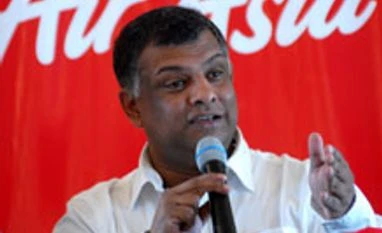Fernandes also hit out at Indian airlines saying the entire civil aviation industry had tried to block AirAsia’s entry into India.
Fernandes made the remarks in a television interview on Monday. This is the first time that he has raised concerns about the dual airline strategy of the Tata group, his partner, in AirAsia India.
The Tata group holds 30 per cent and industrialist Arun Bhatia has a 21 per cent stake in AirAsia India, while the rest is held by the Malaysian airline. Last September, Bhatia had expressed displeasure with the Tatas for keeping him in the dark about its joint venture with SIA. However, Fernandes at that time said the Tata-SIA deal created no issues for AirAsia India.
Asked whether there was room for the two airlines to co-exist, Fernandes responded: “There will be some cannibalisation without doubt. That is for the Tatas to sort out. They will have to define their business model.’’
Tata-SIA did not respond to a query seeking comments on Fernandes’s remarks.
Fernandes’ concerns are understandable as in India, fares of full-service carries (FCCs) and low-cost carriers (LCCs) are more or less at the same levels compared with any other global market where both have a separate niche area of operation.
However in India, confronted with losing market share, the FCCs have been pricing their fares at the same level or just a little above the LCCs. According to analysts, if this prevails, then there is no reason to believe that Tata-SIA will lock horns with Air Asia in the domestic marketplace.
Fernandes also accused all the airlines in India of blocking AirAsia. “The entire aviation industry has tried to block us. We have not experienced this (such opposition) in any other country,” he said, adding he did not stop the launch of rival Malindo Air from starting operations in Malaysia. “Many people do not want us to start, which means we must be quite good,” he quipped.
The Federation of Indian Airlines, a group of private Indian Airlines, has moved the Delhi High Court against the issue of permit to AirAsia. The high court has issued notices to the government on the issue. However, the government has made it clear that it will not stop the launch of airlines just because of opposition from rivals. “The ministry is acting on well laid-down policies. The policies are clear and it cannot act based on individual interpretations,” aviation secretary Ashok Lavasa told reporters last week.
AirAsia is awaiting Directorate General of Civil Aviation's nod to launch its India operations. On Saturday it received its first 180-seater Airbus A320 and has permission to import ten aircraft. Last year Fernandes had indicated he hoped to start with two-three planes and then scale up.
"Our plan will be the same. A lot of virgin routes, create new traffic flows. Our fares will be aggressive and will stimulate the market,'' Fernandes said in his interview on the sidelines of an investment conference in Hong Kong.
There are no real low cost airlines in India, he said adding that despite the promotional fares offered by IndiGo and SpiceJet, the average fares in India remained high. Deccan was the last low cost airline in India but it had an unsustainable model, he added.
What he said in Sept 2013 and what he said today
"I have (had no issue) and continue to have no issue on SIA (Singapore Airlines) and Tatas. No difference to Ginger and Taj hotels. These are two very separate business," Fernandes tweeted in September 2013
"There will be some cannibalization without doubt. That is only for the Tatas to sort out. They will have to define their business model. Otherwise there will be some cannibalization,'' Fernandes in a tv interview today.
)